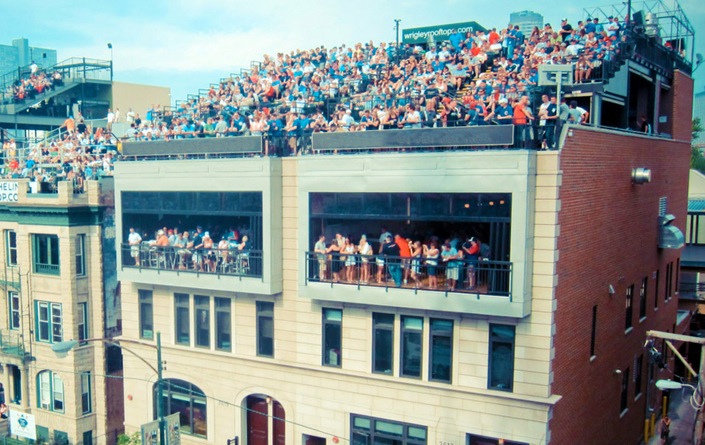It was announced by federal prosecutors on Friday that R. Marc Hamid, the owner of Skybox on Sheffield, a rooftop club across the street from the Chicago Cubs’ Wrigley Field, has been indicted on federal fraud charges for not paying about $600,000 owed to the Cubs as well as state and local taxing bodies. Skybox on Sheffield opened in 1993 and is located just inside Wrigley’s right field foul pole.
Hamid is accused of under-reporting attendance and revenue from 2008 to 2011, according to an indictment handed down Thursday. The indictment states that therefore, the Cubs did not receive as much in royalty payments as they should have under the terms of the rooftop owners’ agreement with the team. He was charged with four counts of mail fraud and will be arraigned at a later date. Prosecutors said that each count of mail fraud carries a maximum sentence of 20 years in prison and a $250,000 fine, or an alternate fine of twice the loss or twice the gain, whichever is greater.
This is not the first time that the Cubs organization has used government to enforce its will upon the owners of the rooftops. The rooftops have been around since 1914, when they provided a free view of the Cubs games. Because there were only a few dozen people watching from the rooftops and windows of the buildings, the Cubs gave them no problems. However, the Cubs’ popularity rose in the 1980s, as the team won National League East division titles in 1984 and 1989. During this period, formal seating structures began to appear, and building owners began charging admission. It was at this point that the Cubs claimed that the rooftops “used the Cubs organization’s product for personal and financial gain.”
Consequentially, in 2002, the Cubs filed a lawsuit against the facilities for copyright infringement, and in 2004, 11 of the 13 roofs settled out of court, agreeing to pay 17% of gross revenue in exchange for official endorsement. By 2014, there were 15 former residential apartments which had since evolved into rooftop businesses.
This is a particularly troubling issue. The Cubs have been using the force of the state to take from the owners of these businesses. Due to pure luck, those who owned the apartments which were adjacent to Wrigley Field found themselves in lucrative positions. While it may have made sense to offer their views for free when there was no demand, they followed simple economics principles as supply of customers went up. As long as patrons are willing to pay the price that they charge, they have every right to use their locations to their advantage. By filing suit in 2002, the Cubs essentially made the claim that they had the exclusive right to provide the view of baseball games.
While many of the men and women who own these rooftops were able to provide better lives for their families and better quality to their customers with the funds they received, they must now account for the 17% they must set aside for the Cubs, as well as the percentage they must pay in taxes. For these reasons, they must necessarily raise costs and impose higher burdens on consumers in order to offset these new expenses.
Additionally, as can be seen, rooftop owners must open their private matters to the eye of the government to ensure that they are “following orders.” After this instance, Mr. Hamid will never forget that what he earns from his business will always be owned partially by the state, and that any attempt to hide or mislead the government on the matter of one’s own finances will result in severe punishment.
However, the rooftop owners are not innocent either, as they have demanded that the US District Court halt Wrigley Field’s construction of a 2,250-square-foot right field video board which would block the view of some of these businesses. It would seem that this would have been the better solution for the Cubs to begin with if they were displeased with local rooftops “stealing” their profits.
No entity should have power to use government force to impose burdens on its competition, no matter the context. By keeping bureaucracy out of the private sphere, we can keep market actors honest in their dealings with both consumers and competitors, while preserving rights to privacy and personal ownership.





1 comment